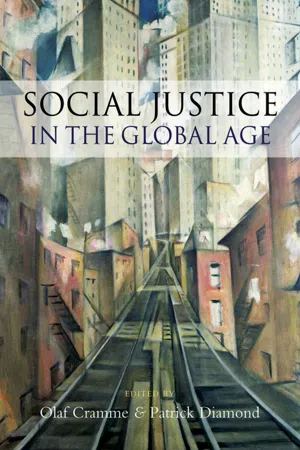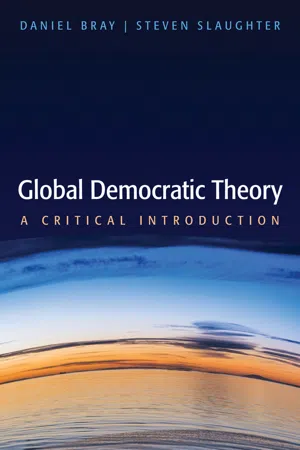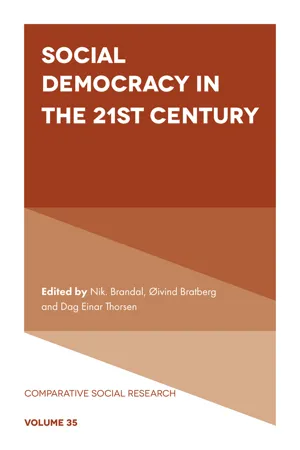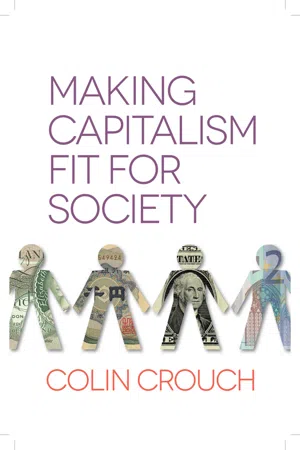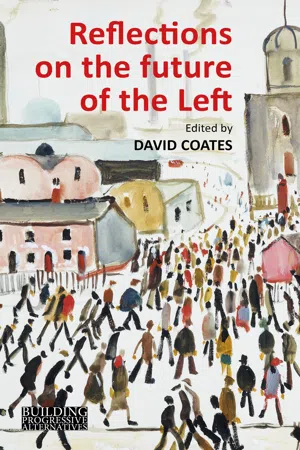Politics & International Relations
Social Democracy
Social democracy is a political ideology that seeks to combine the principles of democracy and social justice. It advocates for a mixed economy with a balance of free market capitalism and government intervention to ensure social welfare and reduce inequality. Social democrats typically support policies such as universal healthcare, education, and social security, aiming to create a more equitable society.
Written by Perlego with AI-assistance
Related key terms
Related key terms
1 of 4
Related key terms
1 of 3
10 Key excerpts on "Social Democracy"
- eBook - ePub
- Olaf Cramme, Patrick Diamond, Olaf Cramme, Patrick Diamond(Authors)
- 2013(Publication Date)
- Polity(Publisher)
III POLITICAL ECONOMYPassage contains an image 7
Moving Beyond the National: The Challenges for Social Democracy in a Global WorldAndrew GambleIn its original forms as it emerged in the nineteenth century, Social Democracy was resolutely internationalist. Existing and established states were associated with the privileged orders of the ancient regime and the embodiment of property interests. The early social democratic movements in Europe saw themselves as operating outside existing forms of the state, creating new forms of co-operation and community beyond the reach of the state, and anticipating the overthrow of the existing forms of the state in a remaking of both politics and society. This transformation was expected to be international. A fundamental tenet of early Social Democracy was that the working class had no country.2 The solidarity of the working class existed across all spatial divisions, whether national or regional, and the new world order which socialists wished to bring about would transcend national divisions.For most of the period since the First World War, however, Social Democracy has been predominantly national in character, following the breakdown of the liberal world order in the two world wars of the first half of the twentieth century. The hopes for building an international solidarity of labour in the nineteenth century had been based on a world in which economic integration was proceeding apace, and in which connections were being established between all regions and all peoples of the globe. The old territorial political divisions were seen as increasingly irrelevant to this new world of freedom of movement of people, goods and capital, which by the first decade of the twentieth century was in certain respects more globalised than the contemporary international order.3 - eBook - ePub
Global Democratic Theory
A Critical Introduction
- Daniel Bray, Steven Slaughter(Authors)
- 2015(Publication Date)
- Polity(Publisher)
6 Social DemocracySocial Democracy in its broadest sense is a position that seeks to transform society in an egalitarian direction via regulatory policies directed by the democratic processes of the state. However, there has been an array of different positions across the history of social democratic thought, which vary between reformist efforts to moderate capitalism and more radical efforts to transform society in a socialist direction. Social democratic thought has also been paralleled by other radical positions, such as anarchism, throughout its history. The impact of globalization, and especially neo-liberalism, has drawn both radical and reformist strands into debates about how democracy ought to be configured to respond to globalization. In particular, the idea of the Third Way rose in prominence in leftist parties around the world during the 1990s as an attempt to create a viable alternative to neo-liberalism and statist Social Democracy. This led to criticisms from more radical scholars that this approach was too accommodating to global capitalism and strayed too far from socialist principles and priorities. While Social Democracy is animated by a democratic ethic of equality, there are also significant debates concerning how such arguments for promoting substantive equality relate to other approaches of democratic theory. Social democratic impulses overlap with liberal, republican and cosmopolitan thought, for example. It is also the case that Social Democracy intersects with deliberative democracy, but social democrats generally question the possibility of such deliberation being genuine within the context of unfettered capitalism.This chapter is focused on the scholarly dimension of social democratic thought but is cognisant that Social Democracy is a broad domain which has involved numerous attempts around the world to develop these principles into political practice and public policy. These attempts include efforts from political parties, trade unions, international movements associated with socialist thought since the First International in 1864, as well as scholarly arguments from an array of reformist and radical positions. Furthermore, it is difficult to separate reformist social democratic thought from social liberalism. Nevertheless, the general position that regulation directed by the state can promote equality is an important argument with respect to how democratic thought can respond to globalization. This chapter will first outline the principles of Social Democracy and consider the way in which capitalist logics of contemporary globalization have challenged these democratic principles. Second, the chapter will outline the main positions of social democratic thought by examining the reformist approach of the Third Way, more substantially reformist accounts evident in work of Will Hutton and Colin Crouch, and other more radical socialist positions exemplified in the work of Alex Callinicos. Third, the chapter considers the questions surrounding the feasibility of implementing social democratic thought as a response to contemporary globalization by considering how it addresses the possibilities of democratic leadership, how Social Democracy ought to relate to other political traditions sympathetic with efforts to regulate capitalism, and the overall plausibility of social democratic forms of political community. - eBook - ePub
Social Democracy
A Comparative Account of the Left-Wing Party Family
- Hans Keman(Author)
- 2017(Publication Date)
- Routledge(Publisher)
These different views on state and society represent simultaneously the values of the various political actors and the related policy goals pursued by them. In general, the goals of Social Democracy are formulated in terms of humanist values. These values are often more or less derived from liberal ideas and mainly of an individualist nature. For instance, the right to associate or universal suffrage have been important goals for the labour movement and have played an important part in mobilising and organising the emerging working class (Abendroth, 1965; Lorwin, 1967; Therborn, 1977; Lipset, 1983; Spoormans, 1988; Giddens, 1998; Flora et al., 1999). Later on, especially after the Second World War, these basic and vital ‘human rights’ were universally acknowledged throughout the established democracies (recall Chapter 2). Since then these goals, once transformed into constitutional rights, have gradually developed into the direction of gaining more freedom to improve everybody’s quality of life in terms of collective rights enhanced through the use of public powers. The development of Social Democratic ideology, however, did not focus at liberal-political values only. Besides stressing the ‘freedom to ’ (act freely as a citizen) also the freedom from (poverty, scarcity etc.) has always been a centrepiece of the socialist creed. The welfare state as a value-related concept therefore always concerns both types of freedom. The development of the welfare state can then be seen as the growing concern of the community for certain values by which it seeks to promote and to defend freedom and equality. Robert Goodin puts this tendency forward as follows: The relationship between freedom and the welfare state surely is, at best and at worst, a mixed one. In some ways, the welfare state promotes certain kinds of freedom for certain people - eBook - ePub
- Nik Brandal, Øivind Bratberg, Dag Einar Thorsen, Nik Brandal, Øivind Bratberg, Dag Einar Thorsen, Nik. Brandal, Øivind Bratberg, Dag Einar Thorsen(Authors)
- 2021(Publication Date)
- Emerald Publishing Limited(Publisher)
For Social Democrats, this may mean that they must return to being the kind of vaterlandslose Gesellen (‘unpatriotic journeymen’), which conservatives and nationalists once claimed they were. Social Democrats, if they are to remain a relevant political force in our century, need to find their own solutions to the problems of an increasingly global age. It would be a death trap for them to become increasingly nationalistic or conservative in an age marked by globalisation and rapid social and technological changes. WHAT IS Social Democracy? Different observers and analysts have defined the term ‘Social Democracy’, found in the title of this book, in different ways. This volume contains contributions with slightly different notions of what Social Democracy actually is and how it compares to related terms such as ‘socialism’, ‘democratic socialism’ and ‘social liberalism’ and usually more encompassing terms – for instance, ‘the left’ or ‘the centre-left’. There is simply ‘no single binding definition’ (Gombert et al., 2009, p. 9). That being said, there seems to be no serious disagreement in the relevant research literature about what Social Democracy actually is, except perhaps at the very margins of the phenomenon. In political science or political sociology, it is quite often taken for granted that Social Democracy is an umbrella term for the ideas and policies of political parties that in some way or another think of themselves as Social Democrats and as belonging to the social democratic ‘family of political parties’ (Escalona, Vieira, & De Waele, 2013) - eBook - ePub
- Colin Crouch(Author)
- 2014(Publication Date)
- Polity(Publisher)
7 Social Democracy as the Highest Form of LiberalismThe point made at the end of the previous chapter, that Social Democracy constitutes a major source of alternatives within capitalist society, gives us a sense of déjà vu of the labour movement's early years, bringing challenge and novelty to a form of capitalism that had worn out its old tramlines and was being sustained mainly by the fact that the interests it served were extremely powerful. But many things have changed since then. In the early decades social democrats, or socialists as they were then interchangeably called, sought to end the capitalist system, replacing it by various state controls, that would themselves eventually give place to various vaguely defined forms of communal economic management. That vision has today largely disappeared, as the market has demonstrated a widespread capacity to serve many though by no means all popular needs, while state control has shown its very dark side in state socialism, and the further alternatives remain as vaguely defined as ever. As discussed in Chapter 1 , Social Democracy has, over time, come to refer to an approach that uses capitalism and the market, but which, through regulation, taxation, the provision of public services, the representation of the interests of the relatively powerless and a strong representation of employees through trade unions, ensures that capitalism serves a wider diversity of human ends than the market itself can ever achieve. Its claims today to be a challenging, innovative force continue to depend on its presentation of alternatives within - eBook - ePub
- Luke Martell(Author)
- 2016(Publication Date)
- Polity(Publisher)
chapter 10 , things do not always work out smoothly in global politics, but the point here is that global social problems push towards the constitution of politics from national to global levels.The competition state and Social Democracy
One way in which globalization, and economic globalization especially, is said to have had a determinant power is in driving states to particular sorts of policies. Specifically, it is said that states pursue neoliberal policies because they have to do so under external pressure from the global economy, competing to attract capital, or because they choose to when under such pressure. Social democratic policies are progressively ruled out, again because they are impossible in the circumstance of globally mobile capital, or because that is how states choose to respond to such circumstances. So competition state theory applies globalization to the nation-state in a particular way: it is specifically about policy and within that it argues especially that neoliberalism is favoured while the prospects for Social Democracy look dim. Competition state theory is in part about the death of Social Democracy (Huber and Stephens 2002; Cerny and Evans 2004). I will give a brief outline of what Social Democracy means, so that we can look at ways in which it is supposed to have been affected by globalization.Social Democracy is a democratic and parliamentary-oriented politics that arose out of socialism, breaking away from Marxism, although its socialist content has been diluted as the years have gone on. Nevertheless, it has put an emphasis on egalitarian and inclusive goals and a concern for poverty. In the past, means for achieving this were seen to be public ownership and redistribution, although as time has passed less transformatory means have been advocated, such as Keynesian demand management and the welfare state (on Social Democracy, see Esping-Andersen 1985; Przeworksi 1985). The argument of competition state theory is that state responses to globalization have shifted away from such a politics and that Social Democracy has been marginalized from politics (see also Hirst 1999 and Crouch 2004). - eBook - ePub
In the Name of Social Democracy
The Great Transformation: 1945 to the Present
- Gerassimos Moschonas, Gregory Elliott, Gregory Elliott(Authors)
- 2016(Publication Date)
- Verso(Publisher)
The first emphasizes the ‘gradualist’ character of the social-democratic approach, underscoring its effective accommodation to the capitalist socioeconomic system. The social-democratic party was an ‘outsider’ that managed to instal itself at the centre of the system, without thereby becoming a centrist party. Located in a temperate zone, it is a force situated between the political extremes. In a sense, Social Democracy becomes synonymous with ‘reformism’ – that ‘old word saturated with meaning’ – and their relationship would appear to be tautological. This is the crucial distinguishing characteristic, the unum necessarium, the essential ingredient, of the notion. 1 Anthony Crosland’s conception – Social Democracy = political liberalism + mixed economy + welfare state + Keynesian economic policy + commitment to equality – may be regarded as the classical version of this approach. Here the category of Social Democracy is basically a generic one, referring to all parties of electoral socialism, whether social-democratic or not. Social Democracy is certainly profoundly reformist. However anti-capitalist it may originally have been, it yielded a social and political regime that is generally regarded as a ‘reformed’ capitalism, both in the methods employed and in the results obtained. But other political currents have been (or are) ‘reformist’, whether out of conviction or necessity (and sometimes in a similar direction to that taken by Social Democracy), without thereby being (or becoming) ‘social-democratic’. In truth, the real question is not whether Social Democracy is reformist, but whether there is such a thing as a social-democratic reformism – a specifically social-democratic reformist savoir-faire. That said, this first way of defining Social Democracy, schematically set out here – the broad definition – results, in my view, in an unduly ‘extensive’ concept of it, one that is not discriminating enough to be operational - eBook - ePub
Education Policy
Globalization, Citizenship and Democracy
- Mark Olssen, John A Codd, Anne-Marie O?Neill, Anne-Marie O?Neill, Anne-Marie O?Neill, Anne-Marie O?Neill(Authors)
- 2004(Publication Date)
- SAGE Publications Ltd(Publisher)
further extended into the interstices of economic and social life …. It was assumed that without the state people would be helpless victims of the ‘blind’ and unpredictable forces of the market. Furthermore, it seemed ‘natural’ that the state’s welfare role should be extended into education and health. The rationale for this was not merely the relief of suffering by the creation of more equal opportunities. ‘Social justice’, where the term refers to the correction of a pure market determination of income so as to produce some desired social ‘outcome’, became perhaps the most predominant feature on the masthead of the new consensus.Under the guiding rubric of ‘consensus’ the modern state at various junctures was still popularly expected to refrain from intrusion into the private lives of individuals, and from the imposition of moral values that might threaten personal autonomy. Contemporary liberalism emphasizes the preservation of civil liberties as well as the personal right to freedom from intervention.The common view of politics which came to prevail under social democratic liberalism is that of its nature as a problem-solving method. Individuals, through interest group membership are thought to be able to utilize such processes. This has been accompanied by a view of the state in social democratic and moderately collectivist political thought, as benign. This conception is in turn linked to a theory of justice which sees that change occurs in a just society as a result of rational and democratic processes. These are thought to automatically respect the equal right of all to participate in deliberations about collective decisions and the equal right of all to have their interests fairly considered (Strike, 1989: 38–9). Rational deliberation about social choices requires criteria of choice which are impartial, universal and rationally accepted. This is necessary for effective social reproduction. The coercive features of the state and its role in the maintenance of structural inequalities have been downplayed by a theory and practice which assumes it to be the purveyor of welfare, and general beneficence (as opposed to the embodiment of legalized force or oppressive conditions). This social democratic view of the state has some affinities with the views of the conservative right, who believe in the preservation of a strong state to ensure maintenance of the social equilibrium. The right’s conception of the breadth of state activity is, however, more limited and their use of coercive means more extensive. This portrayal is intimately connected to the ideological functions of the right’s conceptions of democracy and the legitimation of the state within an entire social and political order. - eBook - ePub
The Politics of Social Democracy
Issues, Dilemmas and Future Directions for the Centre-Left
- Rob Manwaring(Author)
- 2021(Publication Date)
- Routledge(Publisher)
2001 , 16). Whilst these approaches offer an important starting point to understand the landscape of Social Democracy, they can struggle to capture both the variety of contemporary Social Democracy and its historical forms. One way of developing this approach is to disaggregate Social Democracy into different constituent elements.For the purposes of this volume, a three-fold definition of Social Democracy is adopted. Here, Social Democracy is conceived of as a model or series of models (a relatively coherent policy historically situated programme), as an ideological project (a set of systematic values and ideas), and as a political actor or agent (most commonly associated with the family of social democratic and labour parties). These different constituent elements coalesce but also diverge. The three-pronged definitional approach reflects the ‘synthetic’ strategy employed by Randall (2003 ). This strategy does not prioritise any theoretical approach, but rather seeks to understand Social Democracy as a multidimensional phenomenon which is a dynamic interplay of ideas, structure, and agency.Social Democracy as a model
First, we can locate Social Democracy in the typology literature and view it as a changing set of models . Following Randall (2007 ), a model of Social Democracy might include its meta-values, its policy goals and aims. For Randall, the key meta beliefs are a belief in progress, a positive view of human nature, and situating the individual within society (2007 , 8). Or, as Randall argues, ‘Social Democracy is positioned midway between the ontological individualism of classical liberalism and the collectivism of the Marxist tradition’ (2007 , 8). Randall then suggests some key characteristics of Social Democracy, and he ‘operationalises’ this approach by focusing on the main policy aims and goals (in his case, the British Labour party). This dovetails with others, such as Bonoli and Powell (2004 ), who disaggregate Social Democracy into different component parts, including its discourse, ideology, and policy goals and mechanisms.The ‘models’ approach does not necessarily mean we identify fixed, historical models (e.g. Keynesian Demand Management from the 1950s to 1970s in the ‘golden age’), and then insist that this is a fixed or ‘true’ version of Social Democracy. Rather, we use the typologies and models to help understand and map historical changes in Social Democracy. Accordingly, different writers have identified different models of Social Democracy. - eBook - ePub
- David Coates, David Coates, David Coates(Authors)
- 2017(Publication Date)
- Agenda Publishing(Publisher)
There are few examples of where socialist or social democratic movements have survived compromises with nationalist social conservatism. Today the non-aggressive de facto nationalism of the welfare state no longer meets the aspirations of those citizens who want a nationalism that excludes immigrants, turns its back on refugees, and rejects sharing sovereignty with international organizations. Globalization has stretched Social Democracy’s capacity to sustain labour rights, redistributive taxation and a strong welfare state, but there can be no route back from globalization to the combination of free trade and national sovereignty of the first three postwar decades. That period was a temporary way station towards the ever-greater expansion of a global market economy. National economies have become far more inter-dependent, international financial flows more important, new parts of the world have joined the world market economy, enabling at least parts of their populations to climb out of poverty, making products that have reduced the cost of living in wealthy countries, and providing new markets for the products of wealthy countries.For most of the period since the Second World War, politics was shaped around the conflict over egalitarianism, the horizontal axis in Figure 6.1. Modernizing rationalism was taken for granted, rendering the vertical axis apparently meaningless. As some observers noted more than a decade ago, the latter is today resurgent, and this is playing havoc with traditional political divisions.6 For Social Democracy, there is a division between the better educated, young, mainly female professionals, especially in public services, that it attracts, who are strongly committed to modernizing rationalism, and the older, more male manual workers mainly in declining sectors, who used to form its core constituency, and who lean towards the traditionalist pole.There are three potential ways forward from this situation, none of which would bring back the postwar compromise, and only one of which provides a viable if difficult strategy for Social Democracy. First, there can be a retreat into protectionism. This might seem attractive to many on the left, as it offers the possibility of restarting old manufacturing and mining industries, bringing back an industrial working class, and insulating an individual nation from neoliberal financial flows and the blackmail of international corporate investors. However, while a protectionist economy might protect a country from global capital, it creates a group of domestic insider firms who acquire strong political influence and form non-competitive cartels. Not facing international competition, they have little incentive to innovate and ensure the quality of their products. National Social Democracy had its greatest achievements in countries open to world trade – the Nordic lands for lengthy periods, from time to time in Germany and the UK. There have been protectionist wings to the left, as part of a general opposition to free markets and a concern for producer rather than consumer interests, but the strategy has mainly been associated with certain kinds of conservatism in France, Italy and the fascist countries, mainly concerned to protect the interests of local business elites, and is prominent today in the economic policies of Le Pen and Trump.
Index pages curate the most relevant extracts from our library of academic textbooks. They’ve been created using an in-house natural language model (NLM), each adding context and meaning to key research topics.
Explore more topic indexes
Explore more topic indexes
1 of 6
Explore more topic indexes
1 of 4
